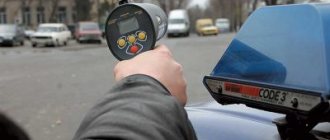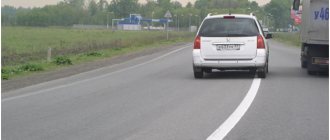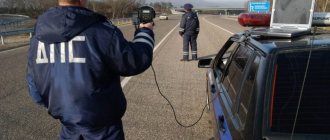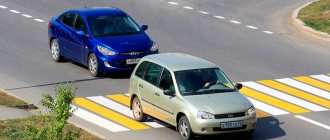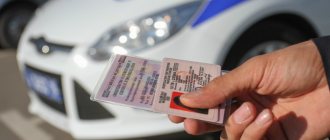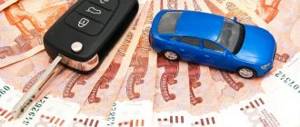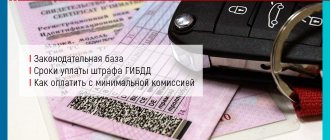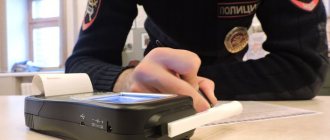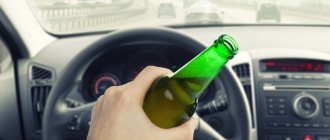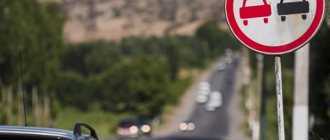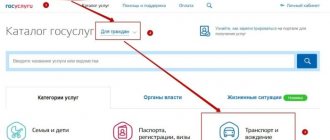AutoUrayt.rf / Questions
Back
Published: March 23, 2020
Reading time: 3 min
0
827
Surely many drivers have encountered the so-called “chain letter”. You can get it if you commit an administrative offense in relation to traffic rules (traffic rules), and automatic recording devices will register it. From this article you will learn what the consequences may be and whether it is possible to lose your license in this way, because modern technologies make it possible to track not only violations of the speed limit, but also driving through an illegal traffic light or making a U-turn across a solid line.
- Is it possible to lose your license for violations recorded by a video camera?
- Peculiarities of proceedings in cases of administrative offenses recorded by technical means operating in automatic mode
- When can you still deprive your camera rights?
- Differences between automatic photo or video recording and recording by a traffic police officer using a camera
- The most serious violations recorded by video recording systems and liability for them provided for by the Code of Administrative Offenses of the Russian Federation
- conclusions
Is it possible to lose your license for violations recorded by a video camera?
According to Russian legislation, deprivation of rights for a violation recorded by a video recording camera is impossible.
Cameras are installed on roads to detect and record the following offenses:
- driving into oncoming traffic or through a double continuous lane;
- driving in areas prohibited for cars, for example when driving in a public transport lane or pedestrian zone;
- deviation from the speed limit or passenger safety rules;
- driving at an inappropriate traffic light signal;
- parking in an unspecified place and many others.
These violations are recorded automatically using special devices. The car owner receives a notice of administrative violation, which he can appeal within ten days.
The provided video or photographic evidence cannot guarantee the absolute authenticity of the offense committed. Thanks to the development of technical means, it does not require much skill to create a fake confirmation from video cameras. Don't forget about possible malfunctions in the software installed in the tracking tools. Therefore, for a violation recorded by the automatic system, punishment is provided mainly in the form of a fine.
More on the topic: Is it possible to put a dog guard on a car?
REFERENCE! For example, for violating the speed limit, the maximum penalty is 5,000 rubles, which is provided for in paragraph 5 of Article 12.9 of the Code of Administrative Offenses of the Russian Federation.
List of violations with automatic recording
Traffic violations that can be recorded automatically are not defined at the legislative level; accordingly, any violations of established traffic rules are subject to recording. Each device used to record violations has a special certificate, which clearly indicates for which offenses in case of non-compliance with traffic rules can be recorded with this particular technique.
These include:
- driving into the oncoming lane;
- ignoring the police inspector's demands to stop;
- running a red light;
- turning around in an active area of vehicle traffic.
Surveillance cameras allow you to record a wide variety of traffic violations. It should be borne in mind that video recording does not always serve as a basis for bringing the driver to justice, including the deprivation of a driver’s license. Each case requires separate consideration by both inspection staff and the judicial authority competent to consider such issues.
When can you still deprive your camera rights?
There are situations in which a violation recorded by a camera may result in deprivation of rights.
In addition to cameras operating in automated mode, there are also manual ones. They are used by traffic police officers.
With this option, the inspector stops the offender and gives him the opportunity to familiarize himself with the received material, which clearly shows the offense. Next, the traffic police officer draws up a protocol. The obtained data, recorded using a technical tool, must be attached to the prepared document.
More on the topic: Types of car rentals. Rent with subsequent purchase
IMPORTANT! The materials themselves confirming an administrative offense in the field of traffic rules are not sufficient grounds for depriving a driver of the right to drive a car.
That is, what sanctions to apply to the violator will be decided only by the judge at the trial. Punishment is imposed solely on the basis of the protocol drawn up.
If you are faced with a situation (for example, the judge is incompetent and has a personal grudge against you) in which you have been deprived of your rights based only on video recording of the offense committed, appeal the verdict.
The application must be submitted to a higher court within 10 days from the date of the verdict. Deprivation of rights based on materials recorded on camera is illegal, so the plaintiff will be acquitted.
Punishment for a violation recorded on video
Taking into account the error of the automatic system, the likelihood of errors and software failures, the difference between various measures of liability, the legislation provides for a number of features. When considering the question of whether rights based on photographic recording can be deprived, it should be borne in mind that in court all particular situations are taken into account:
- the camera has the necessary certificate to detect an offense;
- circumstances under which the administrative offense was committed. For example, the driver will certainly be issued a fine from the camera for driving beyond the stop line. But if at the same time he makes a maneuver, allowing the ambulance to pass, such an offense is contested and the fine is canceled;
- serviceability of the radar or video recording camera.
In any case, within 10 days after receiving the receipt, the violator has the right to file an appeal demanding a review of the case.
Read also: How to restore a lost license Checking your driver's license
Fine
The legislation provides for various measures of material punishment for the perpetrator of the offense. The fines established by the Code of Administrative Offenses for the same article vary depending on the severity of the offense. For example, for violating the speed limit over 60, but up to 80 km/h, a sanction of 2 to 2.5 thousand rubles is imposed.
Such a “fork” allows the traffic police officer to punish the culprit based on the details of the offense he committed. An automatic camera can't do that. Therefore, the program stipulates that in any case, when an offense is detected, it will establish the minimum amount of the fine under the article.
Deprivation of rights
At the moment, for an offense involving the confiscation of a driver’s license from a video or photographic camera or based on radar readings, they can only be issued a fine established by this article. If the paragraph of the Code of Administrative Offenses indicates only deprivation or another punishment not related to a fine, the culprit is issued a receipt for 5 thousand rubles (Part 3 of Article 28.6 of the said code). Thus, deprivation of rights using a video recording camera is not provided for by current legislation. Even after the violation is recorded on camera, car owners cannot be subject to other non-financial penalties for violations, such as:
- compulsory work;
- administrative arrest;
- confiscation of the vehicle.
In this regard, the camera is much more loyal than the traffic police officer. On the other hand, unlike the good inspector, the automatic photo and video recording system does not forgive the offender. And it is also necessary to distinguish between cameras for automatic recording of offenses and recording devices that help along with the traffic police.
Sometimes posts are equipped with cameras, the image from which is sent directly to the inspector who is on duty along the route. Such devices do not issue a fine, however, based on the video recording, a police officer can stop the car owner with all the ensuing consequences for him. In any case, the recorded offense will be processed, and the fine will reach the car owner. Therefore, drivers should regularly monitor camera violations.
conclusions
Thus, a decision on infringement of rights solely on the basis of materials obtained thanks to a technical means of fixation operating in automatic mode is not objective, and therefore, it will be unlawful.
However, do not forget that the roads are patrolled by traffic police officers, who will draw up a protocol in case of violation. Further, everything will depend on the circumstances of the offense and the judge’s decision. So, you always risk losing your right to drive. In addition, do not forget that there are financial penalties for violations in the form of fines.
Checking violations recorded by the camera
If you suspect that there are unpaid fines, it is recommended that you find out this information yourself. Otherwise, the driver may be charged with non-payment.
To check for recorded violations, you can contact your local traffic police department directly. A request is submitted for information about fines, which indicates the license plate number of the vehicle. If there are violations, drivers are required to be notified for subsequent payment.
Another way to check is the traffic police website. It contains information obtained from the federal database. The vehicle number is entered into the required column, after which information about all unpaid fines is provided.
The question of whether a driver's license can be revoked due to a camera is relevant for many drivers. Confiscation is possible in cases of serious offenses recorded by manual video recording. A decision on such a measure is made through the court with the possibility of filing an appeal.
What is the procedure for assigning a fine?
The process itself is practically no different from cases when a violator is stopped at a traffic police post. As soon as the inspector, after viewing the video materials, notes a violation, the procedure is structured as follows:
- a protocol on the administrative offense is drawn up;
- the completed case materials are submitted to the court;
- the judicial authority considers the case and makes a decision;
- the court order is sent to the offender.
Important! In this case, there is a significant nuance - often drivers do not have time to appeal the court decision if they do not agree with it. 10 days are allotted for this from the date of the decision, and the decision often arrives by mail later.
A driver who has received a notification that he has been punished with a fine for violating traffic rules must pay the specified amount within 60 days. If he does not do this, the case will be transferred to the bailiffs, who will initially offer to repay the debt voluntarily, after which they will forcibly collect the debt.
What and how video cameras installed on the road record
Almost every device installed for the purpose of traffic control is capable of recording the following violations:
- driving into the oncoming lane;
- failure to secure people in the car with seat belts;
- entering a lane intended for public transport;
- exceeding the permissible speed limits on a certain section of the road;
- violation of the rules for crossing a pedestrian crossing, etc.
Anyone who is interested in what offenses lead to the deprivation of a driver’s license should know that the traffic rules provide for penalties for all of the listed items. The exception is the absence of seat belts. Here they can only be punished with a fine.
Important! Some regions of the country have installed the latest cameras that can calculate the average speed of a vehicle. They determine the speed at the entrance and exit of the controlled section of the road, carry out simple calculations, which help determine the desired indicator.
If the camera records any of the traffic violations listed above, the driver will soon receive a notification that a fine will be imposed.
Can the right to drive a vehicle be revoked based on video footage?
Today, everyone who is interested in the topic of deprivation of rights using a video recording camera can rest easy. Based on the available video materials, such punishment cannot be taken for violators. If the violation was serious, the court imposes the maximum fine. Thus, the driver manages to avoid deprivation of his license due to video recording, which would be impossible if the car was stopped by traffic police inspectors.
Despite the fact that you don’t have to worry about your driver’s license, you should understand that the maximum fine for serious violations can reach 2,500 and 5,000 rubles. Moreover, if the driver, unknowingly and without being notified, does not pay the fine on time, additional sanctions will be applied to him. To prevent this from happening, every car owner must check his car for fines. It's in his own interests.
General procedure for revocation of a driver's license
Existing laws provide for the possibility of depriving a driver of a driver’s license as a sanction only as a result of a court decision. Therefore, until the judge’s decision comes into force, rights will not be deprived. The procedure for depriving a driver's license comes down to the following steps:
- A traffic police officer detects a violation.
- The traffic police inspector draws up a protocol on the detected violation.
- One copy of the document is given to the driver, and the second is sent to the appropriate judicial station.
- The magistrate sets a time for consideration and notifies the offender.
- At the appointed time, a comprehensive review of the case takes place.
- A court decision is made and a copy is given to the driver.
- After the 10-day appeal period, the decision comes into force, and after that the driver must submit documents to the traffic police.
In other words, the decision to restrict driving a car is made only by a judge. At the same time, for some violations for the first time you can get off with a fine (at the discretion of the judge).
The practice is that for the first violation the judge gives preference to punishment in the form of a fine. If the driver has committed a similar offense repeatedly, in this case the judge will make a decision to revoke the license. In this case, a repeated violation is committed within a calendar year from the date of the first.
Deprivation of rights via video recording of traffic violations: is it possible in 2021?
What am I getting at, the video from the DVR is not evidence, because it was not described in the protocol, and on the DVR it is not clearly clear whether it was my car that violated the violation, or another, and they just followed me and chose my car as the violator .
I am wondering where to get the case materials before it comes to court? And although these devices are developing at a slow pace from a technological point of view, they are currently used to detect a wide variety of traffic violations. First, let's look at the cases in which mistakes made, recorded without the use of technical means of video recording, can serve as grounds for deprivation of a driver's license:

